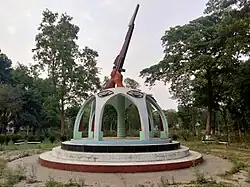Muktabangla
Muktbangla Sculpture is one of the well known sculptures of Bangladesh to commemorate the history of Bangladesh Liberation War.[1][2]
| Muktbangla Sculpture | |
|---|---|
 | |
| General information | |
| Architectural style | Islamic and modern architecture |
| Location | Islamic University campus, Kushtia District |
| Country | Bangladesh |
| Inaugurated | 16 December 1996 |
| Owner | Islamic University, Bangladesh |
| Technical details | |
| Material | Ceramic brick, white, black and mosaic stone |
| Floor count | 7 column |
| Design and construction | |
| Architect(s) | Rashid Ahmed |
| Known for | Monument of Liberation War of Bangladesh |
History
The sculpture was built in 1996 beside to the main gate of Islamic University Kushtia.[3][4] The sculpture was designed by artist Rashid Ahmed.[5][6] The sculpture is built with a combination of Islamic architecture and modern ideas.[7] Muhammad Enam-Ul Haq, the fourth Vice-Chancellor of the Islamic University, inaugurated the sculpture on 16 December 1996.[8][9]
Location
The Mukta Bangla sculpture is located north side of the main gate of the Kushtia Islamic University campus in Kushtia district.[7] On the west side of the sculpture is the located administrative building of the university and on the south side is a sculpture Mrutanjayi Mujib of Sheikh Mujibur Rahman.[10] According to the geographical coordinate system, the location of the Muktbangla sculpture is 23.7230336°N 90.1526242°E.
Architectural significance
There is a circular black plate at the entrance of Mukta Bangla.[11] The Mukta Bangla sculpture features a clenched fist with a rifle, the weapon of liberation, on the seven-pillared dome. It symbolizes the seven-member cabinet of the Provisional Mujibnagar Government of 1971. Each pillar is built on an arch based on Islamic architecture in a jubilant shape with outstretched arms.[12][13]
The red sun in the eyes anticipates the rising sun and the lowermost ceramic large brick indicates constant movement of Bengali.[14] The red ceramic brick on the fourth step from the top symbolizes movement and war, The black brick stone on the second step is a symbol of grief and sorrow, The white mosaic stone on the third step symbolizes alliance and communication and The main floor of the altar is green mosaic blue tiles symbolizing peace. And the entire structure is represented by seven arches collectively representing a half-rising sun.[7]
Reference
- ইসলামী বিশ্ববিদ্যালয়ের দৃষ্টিনন্দন ‘মুক্তবাংলা’ [Magnificent 'Muktbangla' located in Islamic University Kushtia]. Risingbd.com (in Bengali). Retrieved 2021-03-20.
- "Kushtia District". Banglapedia. Retrieved 2021-03-20.
- "Mukta Bangla sculpture, Kushtia-Jhinaidah". Sangramer Notebook. 2019-06-21. Retrieved 2021-04-05.
- মুক্ত বাংলা. onushilon.org. Retrieved 2021-08-13.
- ভাস্কর্যে ভাস্বর মুক্তিযুদ্ধের চেতনা. Prothom Alo (in Bengali). Retrieved 2021-03-20.
- ইসলামী বিশ্ববিদ্যালয়ের দৃষ্টিনন্দন মুক্তবাংলা [Islamic University's beautiful thing is Mukta Bangla]. The Daily Inqilab (in Bengali). Retrieved 2021-03-20.
- ইবির ভাস্কর্যে মুক্তিযুদ্ধ [War of Liberation in IU sculpture]. jagonews24.com (in Bengali). Retrieved 2021-03-20.
- ইবির 'মুক্তবাংলা' ভাস্কর্যে মুক্তিযুদ্ধ ও বিজয় [Liberation war and victory in IU sculpture 'Muktbangla']. Barta24. Retrieved 2021-03-20.
- "campus corner". The Independent. Dhaka. Retrieved 2021-03-20.
- "Mukto Bangla at IU - Eduvista". The Daily Observer. Retrieved 2021-03-20.
- "Liberation War Memorial Sculpture 'Mukt Bangla'". Jamuna News. Archived from the original on 21 Dec 2021. Retrieved 2021-03-20.
- "Short Introduce of Bangladesh". Government Batayon. Retrieved 13 Aug 2021.
- "An Essay: Sculpture in Liberation War". www.myallgarbage.com/ (in Bengali). Retrieved 2021-03-20.
- মহান মুক্তিযুদ্ধের স্মারক ভাস্কর্য ইবির ‘মুক্ত বাংলা’. bd24live.com (in Bengali). Retrieved 2021-08-13.